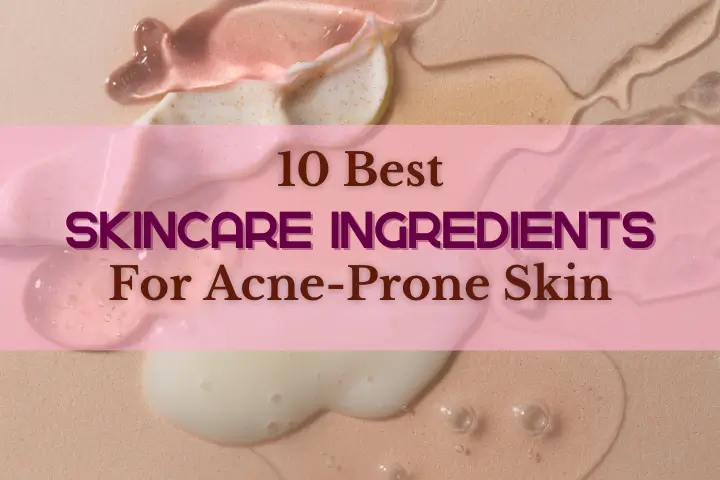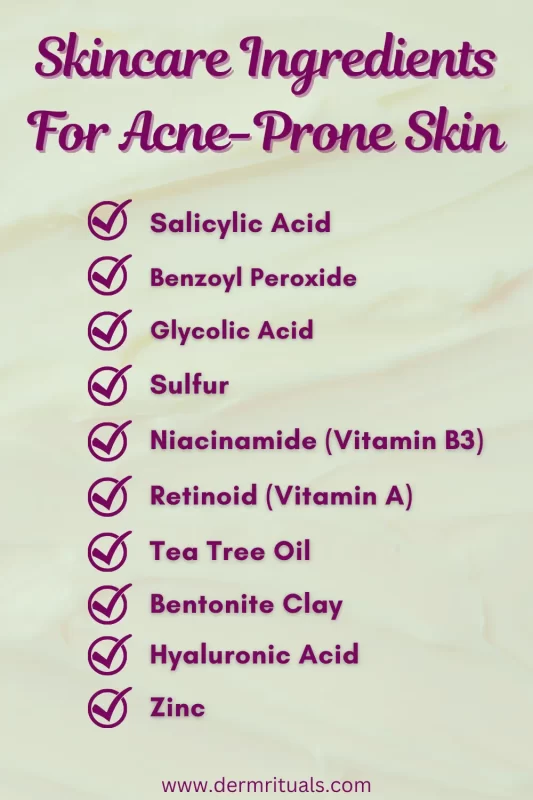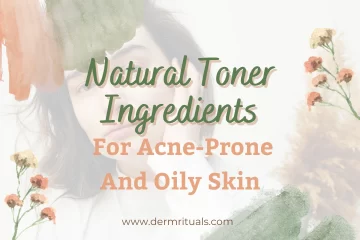10 Best Skincare Ingredients For Acne-Prone Skin

If you’re dealing with acne-prone skin, you’re not alone, and the good news is that there are ingredients that can come to your rescue. In this article, we’re going to delve into the world of skincare and explore the science-backed solutions, and the ingredients for acne-prone skin, that can effectively combat acne.
Skincare Ingredients For Acne-Prone Skin:
Whether you’re looking to prevent acne or treat existing breakouts, these ingredients have your back. Don’t use all of these ingredients at once. use one or 2 ingredients at a time are build your skincare routine up from there.
So here are some ingredients for acne-prone skin that will help you in getting rid of acne:

1- Salicylic Acid: Your Pore-Perfecting Pal
Let’s kick things off with salicylic acid, one of the all-stars in the battle against acne. This beta-hydroxy acid (BHA) is famous for its ability to penetrate deep into your pores, exfoliate away dead skin cells, and prevent those dreaded clogs.
What Research Says:
So, how do we know it works? Well, science tells us so. In a study published in “Cutis” in 2003, researchers found that salicylic acid significantly reduced acne lesions and improved overall skin appearance.
Salicylic acid is like a key that unlocks your pores and lets them breathe, making it a powerful ingredient for anyone with acne-prone skin.
2- Benzoyl Peroxide: The Bacteria Buster
For those who have acne-prone skin, benzoyl peroxide is a household name. It’s your go-to ingredient for completely eliminating acne-causing bacteria. But don’t just take our word for it; science backs it up.
What Research Says:
A study published in the “Journal of Clinical and Aesthetic Dermatology” in 2013 highlighted its antibacterial properties against acne-causing bacteria, making it a crucial weapon in your acne-fighting journey.
3- Glycolic Acid: Exfoliation Extraordinaire
Glycolic acid, an alpha-hydroxy acid (AHA), is another vital player when it comes to combating acne. This powerhouse exfoliates the skin’s surface, enhancing cell turnover and, in turn, reducing acne lesions.
What Research Says:
The proof? A study published in the “Journal of Dermatology” in 2017 demonstrated its effectiveness in improving skin texture and reducing acne inflammations.
4- Sulfur: The Underappreciated Hero
Sulfur(Sulphur) might not always grab the headlines, but it’s a gem for acne-prone skin. It’s renowned for reducing oiliness and has anti-inflammatory properties.
What Research Says:
A study published in the “Journal of Drugs in Dermatology” in 2010 confirmed its effectiveness in reducing the number and severity of acne inflammations.
5- Niacinamide (Vitamin B3): The All-Rounder
Niacinamide, also known as Vitamin B3, is like the Swiss Army knife of skincare ingredients for acne-prone skin. This ingredient tackles all the common skin problems and works great for every skin type. I have talked about using Niacinamide in more detail.
What Research Says:
Shortly, it regulates sebum production and reduces inflammation, as demonstrated by a study in the “Journal of Cosmetic and Laser Therapy” in 2014. So, whether you’re battling excessive oil or red, inflamed pimples, niacinamide has got your back.
6- Retinoids (Vitamin A): The Skincare Superstars
Retinoids, including tretinoin, adapalene, and retinol, are like the superheroes of the skincare world, especially for those dealing with acne. These ingredients increase skin cell turnover, prevent clogged pores, and reduce inflammation.
The only problem is, they can react to your skin if not used properly. Read more about Retinoids before using them.
What Research Says:
The scientific community has backed them up. A study published in “Dermatology and Therapy” in 2017 found that adapalene effectively reduced both non-inflammatory and inflammatory acne.
7- Tea Tree Oil: Nature’s Antibiotic
Nature often provides us with solutions, and tea tree oil is a prime example. It’s renowned for its antimicrobial properties, particularly when it comes to battling acne. There is a lot more to tea tree oil, make sure to read about it before using it.
What Research Says:
A study in “The Australasian Journal of Dermatology” from 2017 attested to its effectiveness in reducing acne lesions and managing oiliness and inflammation.
8- Bentonite Clay: Ancient Elegance
Clay, in its various forms like kaolin and bentonite, might sound like a throwback to ancient skincare practices, but it’s anything but outdated.
Bentonite Clay is known to powerfully absorb excess oil and impurities from the skin, reducing the appearance of acne. you literally feel that this clay is sucking out impurities from your skin.
What Research Says:
Its use has been documented in holistic and alternative skincare practices because it works!! If you’re considering using bentonite clay for acne, it’s essential to do a patch test to ensure you don’t have any adverse reactions. Read more details about Bentonite clay.
9- Hyaluronic Acid: The Hydration Helper
While it’s not a direct acne-fighting ingredient, hyaluronic acid plays a vital role in maintaining skin hydration without clogging pores.
What Research Says:
Proper skin hydration supports overall skin health and its barrier function. It is proven that well-hydrated skin is better equipped to tackle acne. It serves more as a prevention for acne.
10- Zinc: The Inflammation Fighter
Zinc might be less talked about, but it has some solid science behind it. Topical zinc formulations can help reduce inflammation and prevent the formation of comedones (those pesky, pore-clogging plugs).
What Research Says:
Evidence published in “Dermatology Research and Practice” in 2014 suggests that zinc can have a positive impact on acne symptoms by reducing inflammation.
To Conclude:
So there you have it, the best ingredients for acne-prone skin backed by science.
- Each ingredient brings its unique strengths to the table, providing you with a variety of options to tailor your acne-fighting skincare routine to your needs.
- Remember, everyone’s skin is different, so it’s essential to do a patch test before applying anything directly to your face.
- Introduce new products gradually, and consult with a dermatologist for personalized advice.
- With the right ingredients and a consistent skincare routine, you can take charge of your acne-prone skin and enjoy a clearer, healthier complexion.


